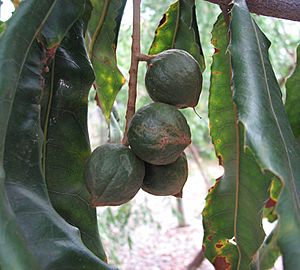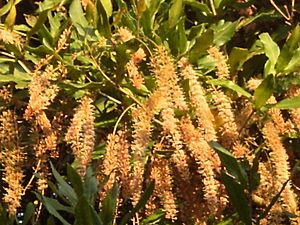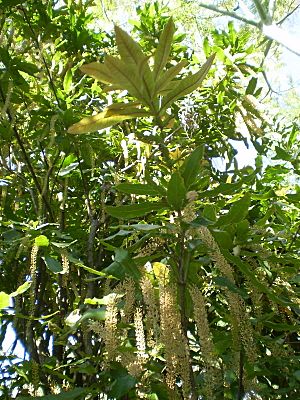Macadamia tetraphylla facts for kids
Quick facts for kids Macadamia tetraphylla |
|
|---|---|
 |
|
| Foliage and fruits | |
| Conservation status | |
|
Vulnerable (NCA)
|
|
| Scientific classification |
|
| Kingdom: | Plantae |
| Clade: | Tracheophytes |
| Clade: | Angiosperms |
| Clade: | Eudicots |
| Order: | Proteales |
| Family: | Proteaceae |
| Genus: | Macadamia |
| Species: |
M. tetraphylla
|
| Binomial name | |
| Macadamia tetraphylla L.A.S.Johnson
|
|
| Script error: The function "autoWithCaption" does not exist. | |
Script error: No such module "Check for conflicting parameters".
The Macadamia tetraphylla is a type of tree that belongs to the Proteaceae plant family. It grows naturally in southern Queensland and northern New South Wales in Australia. People often call it by names like macadamia nut, bauple nut, prickly macadamia, or rough-shelled Queensland nut.
This tree is known for its thick leaves and can grow up to 18 meters (about 59 feet) tall. Its leaves have jagged edges and are usually 7 to 25 centimeters (about 3 to 10 inches) long. The name "tetraphylla" means "four leaves." This is because it usually has four leaves growing around each part of the stem, unlike other macadamia types that might have three.
The tree produces long, hanging flowers that can be white, pink, or purple. After the flowers, it grows round, woody fruits. These fruits are 2 to 3 centimeters (about 1 inch) wide and hold edible seeds inside. The shell of this macadamia nut often feels bumpy or "rough," which is how it got one of its common names.
Contents
Where Macadamia Nuts Grow Around the World
Macadamia tetraphylla trees have been brought to other countries, like Mexico. They grow well in Mexican states such as Michoacán and Jalisco. Macadamia nuts have become an important crop for Mexico to sell to other countries. Hawaii is currently the biggest seller of macadamia nuts worldwide.
These macadamia trees do not grow very well in places that are extremely close to the equator (the pure tropics). For example, plantations in Costa Rica, which is 10 degrees north of the equator, produce much less than those in Hawaii. Hawaii is further from the equator, at 19 to 22 degrees north. However, some individual trees in tropical areas have grown well, so special trees might be chosen for those climates.
Macadamia tetraphylla nuts have more sugar than another common type, Macadamia integrifolia. This higher sugar content can make them burn easily when baked in cookies or other desserts. Because of this, most macadamia nuts sold in stores are the integrifolia type, which bakes more evenly. However, many people grow tetraphylla or mixed types (hybrids) in their home gardens. Some people prefer the sweeter taste of tetraphylla, especially when eating them raw.
Australia's First Commercial Native Food Crop
The Macadamia tetraphylla was the very first native Australian food plant to be grown on a large scale for money by non-Indigenous Australians. The first commercial macadamia farm was started in the early 1880s. It was planted by Charles Staff at Rous Mill, near Lismore, New South Wales. This farm grew only M. tetraphylla trees.
Young trees from this original farm were used for many years to grow new, modern macadamia varieties. The original farm was eventually cleared in the 1990s and replaced with newer, grafted trees.
Even though macadamia nuts are now grown all over the world, the Macadamia tetraphylla is considered a vulnerable species in its home country of Australia. This means it's at risk of disappearing. Its natural homes have been lost or damaged. This happened because rainforests were cleared for farms and towns. Also, invasive weeds and poor fire management have harmed their habitats.
Healthy Benefits of Macadamia Nuts
Like many other nuts and olives, macadamia nuts are full of healthy fats. These are called monounsaturated fatty acids. About 86% of a macadamia nut's fat is this healthy type. Monounsaturated fatty acids are known to help lower bad cholesterol in your blood.
Some research suggests that eating a small amount of macadamia nuts each day can be good for your heart. This is especially true if you eat them as part of a diet that is low in unhealthy fats and cholesterol. Remember, it's important to enjoy them in moderation as part of a balanced diet.
See also
 In Spanish: Macadamia tetraphylla para niños
In Spanish: Macadamia tetraphylla para niños
 | Ernest Everett Just |
 | Mary Jackson |
 | Emmett Chappelle |
 | Marie Maynard Daly |



